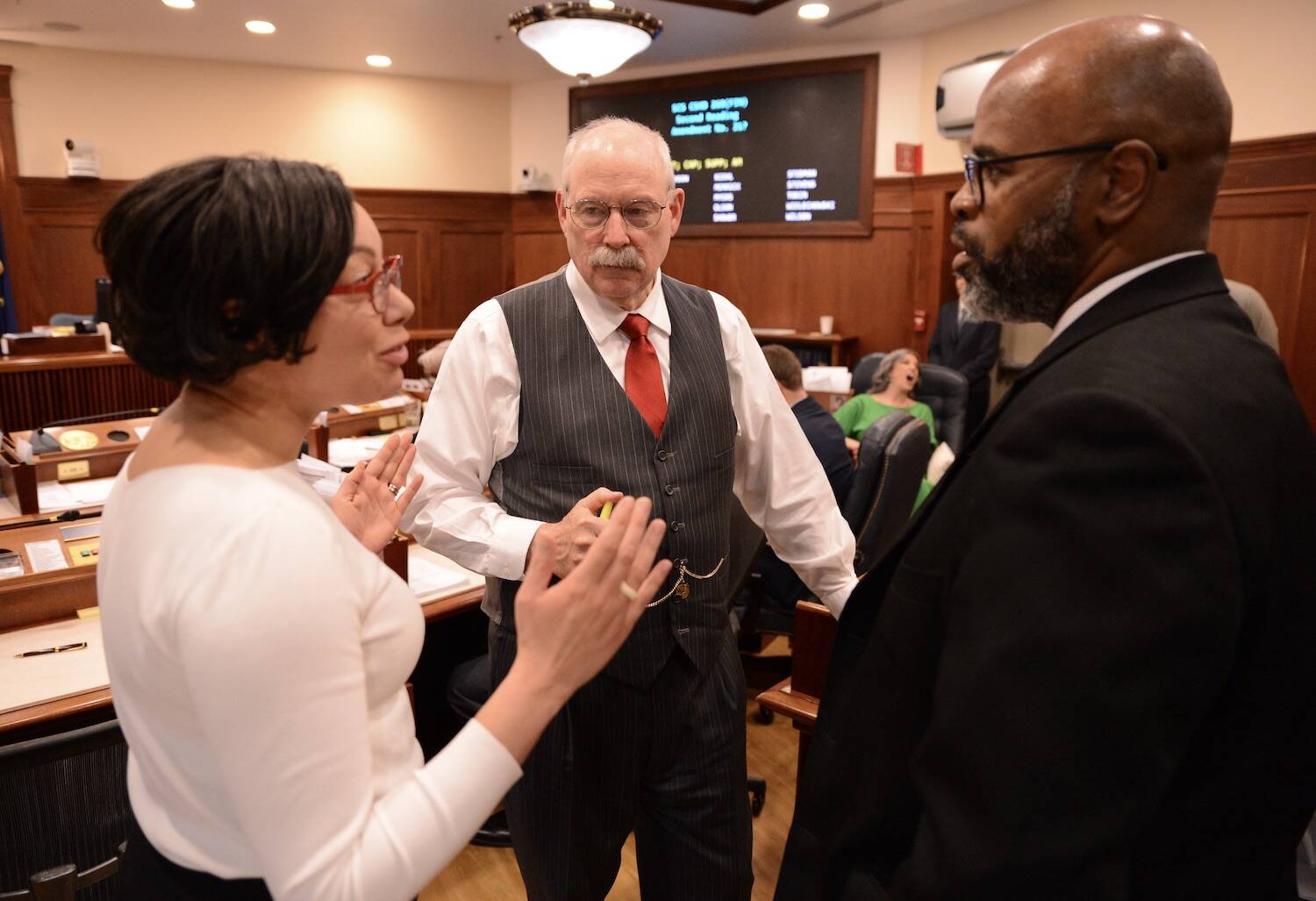The Alaska Senate on Wednesday approved a draft $12.25 billion state operating budget and in the process, finalized legislative plans to offer public schools a one-time, $175 million funding bonus.
The Senate’s proposed Permanent Fund dividend is about $1,580 per recipient, including an estimated $222 energy relief payment. That’s below the $2,270 figure included in a competing draft passed by the House, and the final figure will be subject to further debate.
The smaller amount reduces the risk of the state spending down savings.
“We’re living within our means. This is what it looks like,” said Sen. Bert Stedman, R-Sitka and co-chair of the Senate Finance Committee.
Stedman said the budget balances if the state’s oil production hits estimates and if North Slope oil prices average $78 per barrel between July 1, 2024, and June 30, 2025.
Oil and other sources of revenue would be enough to pay for state operations, as well as new legislation and the state’s capital budget, which pays for construction and renovation projects statewide.
Wednesday’s 17-3 vote, which follows the state House’s passage of its own draft operating budget, triggers the final phase of the Alaska Legislature’s annual budget process, where legislators negotiate a compromise between the two drafts.
In places where the drafts match, the relevant item is final, except that Gov. Mike Dunleavy has the ability to reduce or eliminate final items with his line-item veto power. He cannot increase them or add new ones.
On education, the Senate included a $680 one-time boost to the state’s Base Student Allocation, the core of Alaska’s per-student funding formula.
That’s worth about $175 million statewide, and the same language is in the House’s draft budget, making the item final, except for the governor.
Last year, Dunleavy vetoed half of an identical one-time boost, but in a news conference with reporters on Wednesday, the governor signaled that he may not repeat his veto.
“I’ve told people I’m open to the increase,” Dunleavy said, “an increase in one-time funding, especially to help with the inflationary issues.”
The Senate budget also includes a House-adopted plan to spend $5.2 million more on reading programs for students in kindergarten through third grade.
Senators included additional money for student transportation, something that will have to be negotiated with the House, which did not include it.
Also subject to further negotiation is $11.9 million in education money added after the federal Department of Education warned that the state underfunded some school districts during the COVID-19 pandemic.
The Senate is led by a supermajority of nine Democrats and eight Republicans, and Wednesday’s draft budget was crafted by that supermajority.
Before the final vote, the three Republicans outside the majority offered 21 amendments containing a variety of priorities, but all failed.
The most contentious amendments dealt with the amount of this year’s Permanent Fund dividend, which Stedman labeled “the focal point of most budgets.”
Sen. Mike Shower, R-Wasilla, proposed taking extra money from the Alaska Permanent Fund to increase the Senate’s proposed dividend to a figure above the House’s amount, once the energy relief payment is included.
While much of the fund is constitutionally protected, lawmakers need only a simple majority to break a law that limits spending from the fund’s earnings reserve, which contains money accumulated from the fund’s investments.
Shower said his proposed dividend is what was recommended by a bipartisan, bicameral working group and implied that passage could encourage work on a plan to bring the state’s long-term finances into balance.
He had support from Sen. Shelley Hughes, R-Palmer, who said, “If we were to pass this, we would start on the road toward a fiscal plan.”
But a majority of other senators opposed the idea. Stedman said he believed the amendment would instantly create a billion-dollar deficit.
“I don’t think this is a prudent amendment,” he said.
Sen. Forrest Dunbar, D-Anchorage, said he’d like to see larger dividends, but thus far, the Legislature hasn’t advanced other needed components of the financial plan, including new state revenue.
Shower’s amendment failed, 6-14.
The House and Senate are expected to appoint lawmakers to a budgetary conference committee on Monday, starting work on a final budget draft.
The budget is typically the final item passed before the Legislature adjourns for the summer.
• James Brooks is a longtime Alaska reporter, having previously worked at the Anchorage Daily News, Juneau Empire, Kodiak Mirror and Fairbanks Daily News-Miner. This article originally appeared online at alaskabeacon.com. Alaska Beacon, an affiliate of States Newsroom, is an independent, nonpartisan news organization focused on connecting Alaskans to their state government.

